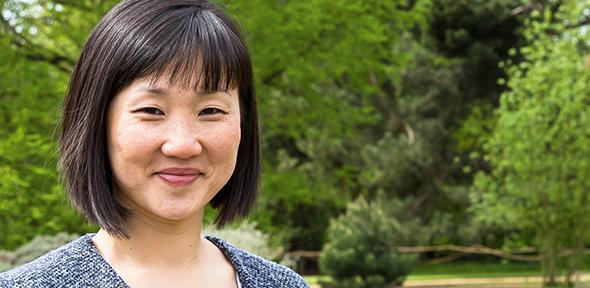
The idea of developing more sustainable fuels fascinates postdoctoral researcher Dr Jenny Zhang. She has been working in Professor Erwin Reisner’s group on the science of artificial photosynthesis and the development of 'green' solar fuels. Now, following the award of a BBSRC David Phillips Fellowship, she is setting up her own independent research group here.
It was my mother who first got me interested in science.
When I was a very young child, back home in China, she used to tell me bedtime stories that explained the origins of lightning and thunder, how radios work, or how eggs are hatched. This apparently had a profound affect on me. Eggs would regularly go missing from the kitchen and turn up buried snugly under some blankets in bed. Or the new radio would be found dismantled, presumably taken apart by someone who wanted a better look inside...
My PhD research was in medicinal chemistry.
My aim was to design anti-cancer drugs that could penetrate deep into solid tumours. To achieve this, I synthesised a library of novel DNA intercalators and anti-cancer platinum complexes, and studied their bio-distribution and metabolism within 3D-tumour models using a variety of chemical imaging techniques (which had the added advantage of enabling me to travel to many synchrotrons around the world). I was able to arrive at new drug design strategies using this approach.
I value environmental sustainability. That’s why I moved into artificial photosynthesis.
My PhD research was highly interdisciplinary and during it, I developed a deep appreciation of how interdisciplinary approaches can breathe fresh ideas into old problems and can often catalyse breakthroughs. Artificial photosynthesis for sustainable fuel development is also a highly interdisciplinary field. And as a research area, it aligns with my personal values about the importance of environmental sustainability.
I came to the department nearly five years ago as a Marie Curie Incoming International Fellow to work on artificial photosynthesis in Erwin Reisner’s group. I was excited by the notion that, coming from quite a different background, I would be able to bring unique perspectives into the field. I also liked the idea of being immersed in a new learning experience. It turned out to be more challenging – and at the same time more fulfilling – than I expected.
We’re designing new catalytic systems to turn sunlight into 'solar fuels'.
We’re interested in turning sunlight into chemical fuels we call 'solar fuels' – sustainable and green alternatives to our current unsustainable and polluting carbon-based fuels. Plants have been doing this for millions of years through the process of photosynthesis. The process is supported by enzymes, so we study enzymes and the reactions that they carry out, and have made a number of prototype systems that can use sunlight to turn sustainable starting materials into solar fuels. We hope this work will help make such fuels available to everyone in future.
To do this, we need to understand the basic biophysics behind many life-sustaining components of nature.
My research interfaces natural photosynthetic systems with synthetic materials and chemical biology techniques to develop the basic science behind artificial photosynthesis. More specifically, I’m wiring photosynthetic enzymes, such as photosystem II, as well as living cyanobacterial cells to high surface area electrodes to study their photoelectrochemical properties.
My Fellowship allows me to develop this line of research independently.
It’s the next step for me as it allows me to follow my own vision for my research. My group officially gets underway in July and we will be researching the electron transfer mechanism behind (photo)electrogenic biofilms and how this can be exploited as a source of renewable energy. I’ll be supported by a very generous grant that gives me money for two postdocs and the necessary equipment – a very sophisticated, high-tech 3D printer that allows me to print a lot of very different types of materials from live cells to metal.
The Fellowship will also help me build my leadership skills.
It aims to get Fellows on the trajectory to leading our own research groups confidently and successfully. So we’ll have a mentor and I’ll be able to attend workshops where I can learn about leadership. I really like that this scheme offers not just money but career progression to help me become a leader in science. I feel very lucky to have gotten this opportunity.
I hope my career will lead to the uncovering of many 'unknown unknowns'.
I want to drive creative and high value research – but I want to achieve this whilst also fostering a culture of curiosity and supportive openness in any team that I lead. Like any scientist, I hope my career will lead to the uncovering of many 'unknown unknowns' that would leave a positive impact in the world.
It’s important to me that we inspire more students – both girls and boys – to choose science.
I still turn up to meetings and workshops where I am either the only female, or one of the few females present. However, this is getting less and less, and I feel that there is a real effort being made by large institutions to be inclusive and lower barriers. The old barriers still exist, but I think women are more courageous than ever in trying to climb over them, and I’m optimistic since I’m aware of how determined women can be.
In the meantime, I think we shouldn’t forget about positive action being needed to foster males to challenge their own status quo to become strong counterparts of the future.

